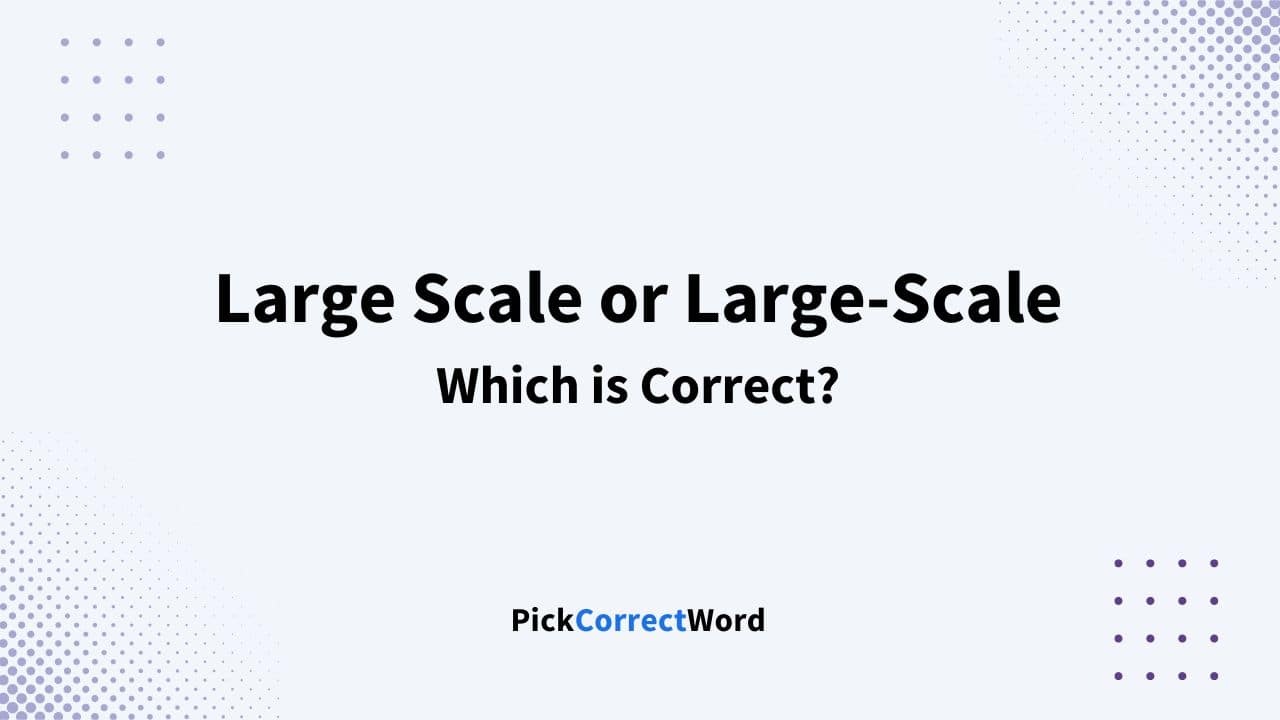Wondering whether to use large scale or large-scale? You’re not alone. This is a common question when it comes to using hyphenated words correctly.
‘Large-scale’, with a hyphen, is used as an adjective right before a noun. For example, in ‘large-scale production’.
‘Large scale’, without the hyphen, is typically used after a noun, like in ‘production on a large scale’.
But there’s one usage that’s more accepted than the other. We’ll explore the differences between the two, which one is generally preferred, and why it’s chosen more often.
Large Scale or Large-Scale? Which is Correct?
Both “large scale” and “large-scale” are correct. It all depends on where in the sentence you’re using the phrase.
When you want to describe the size or extent of something right before a noun, use “large-scale.” It’s the correct phrase to use as an adjective in this case.
On the other hand, if you’re discussing the size of something but it’s not directly describing a noun, then “large scale” without a hyphen is the way to go. For instance, you would say, “The event was held on a large scale.”
Large-Scale: Meaning and Usage
When you use ‘large-scale’, it means something is extensive or significant, especially when describing nouns. The hyphen in ‘large-scale’ links the words to form a single descriptive phrase.
You should use the hyphenated “large-scale” before a noun as it helps the two words work together to describe something.
Example:
- Planning a large-scale event means you’re organizing an event with many components or a wide reach.
- A large-scale map details a broad area, often with extensive features or data points.
In both situations, ‘large-scale’ acts as an adjective providing more details about the noun that comes after it—’event’ and ‘map’. The hyphen is important because without it, the words might be read as less connected, which could change the sentence’s meaning.
Large Scale: Meaning and Usage
“Large scale” without the hyphen suggests something is big in size, amount, or degree. You’d usually use this form after a verb or a preposition when you’re talking about the size of an action or event.
Example:
- The company is planning expansions on a large scale.
In this sentence, “large scale” describes the noun “expansions,” suggesting they are quite large or extensive.
Examples of Using “large-Scale“ in A Sentence
“The city is planning a large-scale cleanup after the storm.“
“We are working on a large-scale project that will significantly improve our services.“
“The organization is hosting a large-scale conference next month.“
“The government announced a large-scale investment in renewable energy.“
“The company is facing a large-scale data breach affecting millions of users.“
Examples of Using “Large Scale“ in A Sentence
“The company is planning to increase its production on a large scale.“
“The restaurant is sourcing ingredients locally on a large scale.“
“The disaster relief efforts were carried out on a large scale.“
“The business plans to expand its operations on a large scale.“
“The concert was held on a large scale, with over a hundred performers.“
Frequently Asked Questions
Can ‘large scale’ and ‘large-scale’ be used interchangeably?
No, they can’t be used interchangeably due to their different usages. ‘Large-scale’ modifies a noun directly, while ‘large scale’ describes the extent or magnitude of an action or event.
Why is the hyphen important in ‘large-scale’?
The hyphen in ‘large-scale’ is crucial because it links the words to form a single descriptive phrase. Without it, the words could be read as less related, which might alter the meaning of the sentence.
Are there other similar phrases to ‘large-scale’ that also require a hyphen?
Yes, similar phrases such as ‘small-scale’, ‘full-scale’, or ‘wide-scale’ also require a hyphen when they’re used as adjectives directly before a noun.


